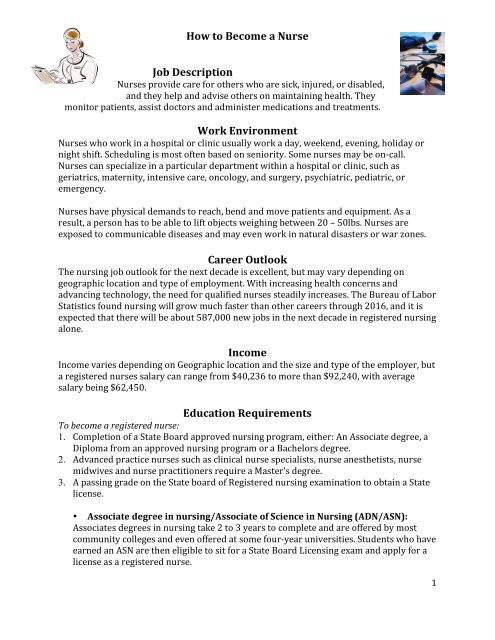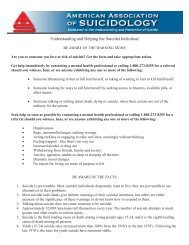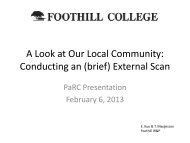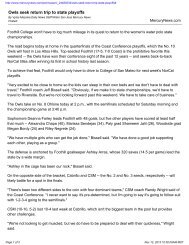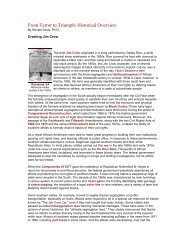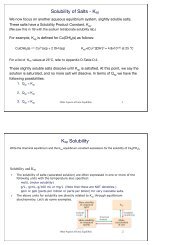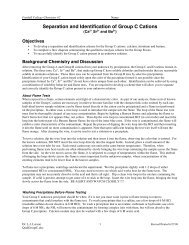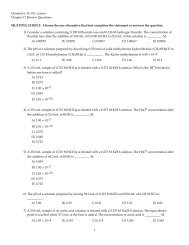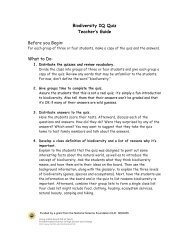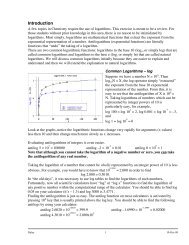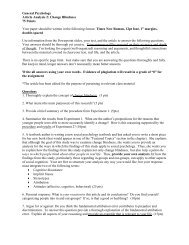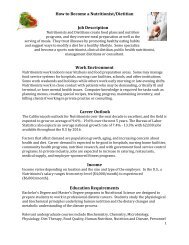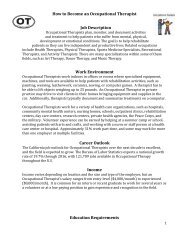How to Become a Nurse 1 - Foothill College
How to Become a Nurse 1 - Foothill College
How to Become a Nurse 1 - Foothill College
You also want an ePaper? Increase the reach of your titles
YUMPU automatically turns print PDFs into web optimized ePapers that Google loves.
<strong>How</strong> <strong>to</strong> <strong>Become</strong> a <strong>Nurse</strong><br />
Job Description<br />
<strong>Nurse</strong>s provide care for others who are sick, injured, or disabled,<br />
and they help and advise others on maintaining health. They<br />
moni<strong>to</strong>r patients, assist doc<strong>to</strong>rs and administer medications and treatments.<br />
Work Environment<br />
<strong>Nurse</strong>s who work in a hospital or clinic usually work a day, weekend, evening, holiday or<br />
night shift. Scheduling is most often based on seniority. Some nurses may be on-‐call.<br />
<strong>Nurse</strong>s can specialize in a particular department within a hospital or clinic, such as<br />
geriatrics, maternity, intensive care, oncology, and surgery, psychiatric, pediatric, or<br />
emergency.<br />
<strong>Nurse</strong>s have physical demands <strong>to</strong> reach, bend and move patients and equipment. As a<br />
result, a person has <strong>to</strong> be able <strong>to</strong> lift objects weighing between 20 – 50lbs. <strong>Nurse</strong>s are<br />
exposed <strong>to</strong> communicable diseases and may even work in natural disasters or war zones.<br />
Career Outlook<br />
The nursing job outlook for the next decade is excellent, but may vary depending on<br />
geographic location and type of employment. With increasing health concerns and<br />
advancing technology, the need for qualified nurses steadily increases. The Bureau of Labor<br />
Statistics found nursing will grow much faster than other careers through 2016, and it is<br />
expected that there will be about 587,000 new jobs in the next decade in registered nursing<br />
alone.<br />
Income<br />
Income varies depending on Geographic location and the size and type of the employer, but<br />
a registered nurses salary can range from $40,236 <strong>to</strong> more than $92,240, with average<br />
salary being $62,450.<br />
Education Requirements<br />
To become a registered nurse:<br />
1. Completion of a State Board approved nursing program, either: An Associate degree, a<br />
Diploma from an approved nursing program or a Bachelors degree.<br />
2. Advanced practice nurses such as clinical nurse specialists, nurse anesthetists, nurse<br />
midwives and nurse practitioners require a Master’s degree.<br />
3. A passing grade on the State board of Registered nursing examination <strong>to</strong> obtain a State<br />
license.<br />
• Associate degree in nursing/Associate of Science in Nursing (ADN/ASN):<br />
Associates degrees in nursing take 2 <strong>to</strong> 3 years <strong>to</strong> complete and are offered by most<br />
community colleges and even offered at some four-‐year universities. Students who have<br />
earned an ASN are then eligible <strong>to</strong> sit for a State Board Licensing exam and apply for a<br />
license as a registered nurse.<br />
1
<strong>How</strong> <strong>to</strong> <strong>Become</strong> a <strong>Nurse</strong><br />
• Diploma from approved nursing program: In the United States this Diploma is<br />
offered by hospital-‐based nursing schools, and takes 3 years <strong>to</strong> complete. The number<br />
of hospital-‐based nursing schools continues <strong>to</strong> decrease but many still exist. Some<br />
require that non-‐nursing prerequisite courses be completed at another school prior <strong>to</strong><br />
admission or coordinate their program with classes at a nearby school, but some are<br />
self-‐contained. Students awarded a Diploma in nursing are then able <strong>to</strong> sit for a State<br />
Board licensing exam and apply for a license as a registered nurse.<br />
• Bachelor of Science in Nursing (BSN): Offered at four-‐year colleges and<br />
universities, takes 4 years <strong>to</strong> complete. Advancement opportunities are more readily<br />
available for students who have completed a BSN as compared <strong>to</strong> those who have<br />
earned a Diploma or Associate degree. Bachelor’s degree programs in nursing offer<br />
more clinical experience in nonhospital settings, and more training in areas such as<br />
communication leadership and critical thinking. A bachelor’s degree or higher is often<br />
required for administrative, research, consulting and teaching positions.<br />
• Master of Science in Nursing: Usually take 18 <strong>to</strong> 24 months <strong>to</strong> complete. Most<br />
master’s degrees in nursing require a Bachelor’s degree in Nursing (BSN), an RN license<br />
and minimum clinical experience.<br />
Local <strong>College</strong>s:<br />
Canada <strong>College</strong> CSU East Bay UC Davis<br />
City <strong>College</strong> of San Francisco CSU Sacramen<strong>to</strong> State Univ. UC Irvine<br />
<strong>College</strong> of San Mateo CSU San Francisco State Univ. UCLA<br />
DeAnza <strong>College</strong> CSU San Jose State Univ. UC San Francisco<br />
Evergreen Valley <strong>College</strong> CSU Sonoma State Unvi.<br />
Gavilan <strong>College</strong><br />
Mission <strong>College</strong><br />
Licensing & Certification<br />
All Nursing students must graduate from an approved nursing program and pass a national<br />
licensing examination given by the State’s Board of Nursing, known as the National Council<br />
Licensure Examination or NCLEX-‐RN, in order <strong>to</strong> obtain a nursing license. Other<br />
requirements for licensure vary by state.<br />
Warnings<br />
<strong>Nurse</strong>s may be in close contact with patients who have infectious diseases, as well as with<br />
<strong>to</strong>xic, harmful or potentially hazardous solutions and medications. <strong>Nurse</strong>s must follow<br />
strict guidelines <strong>to</strong> guard against disease and other dangers such as those posed by<br />
radiation, accidental needle pricks, and anesthetics and by chemicals used <strong>to</strong> sterilize<br />
instruments. <strong>Nurse</strong>s may also be required <strong>to</strong> frequently lift and move heavy objects and<br />
equipment<br />
2
<strong>How</strong> <strong>to</strong> <strong>Become</strong> a <strong>Nurse</strong><br />
Sources of Additional Information<br />
For information on a career as a registered nurse and nursing education:<br />
National League for Nursing<br />
61 Broadway, 33 rd Floor<br />
New York, NY. 10006<br />
www.nln.org<br />
For additional information on registered nurses:<br />
American <strong>Nurse</strong>s Association<br />
8515 Georgia Ave., Suite 400,<br />
Silver Spring MD, 20910<br />
http://nursingworld.org<br />
For a list of accredited clinical nurse specialist programs:<br />
National Association of Clinical nurse Specialists<br />
2090 Lingles<strong>to</strong>wn Rd, Suite 107.<br />
Harrisburg, PA, 17110<br />
www.nacns.org<br />
For General information on registered nurses in all fields and specialties:<br />
American Society of Registered <strong>Nurse</strong>s<br />
1001 Bridgeway, suite 233,<br />
Sausali<strong>to</strong>, CA 94965<br />
www.asrn.org<br />
Occupational Outlook Handbook<br />
2010-‐2011<br />
Available in Career Center Library<br />
Eureka: The California Career Information System<br />
www.eureka.org<br />
Site Code: For current <strong>Foothill</strong> students only, please contact the Career Center<br />
Career Center Resource Library<br />
Room 8329<br />
(650) 949-‐7229<br />
3


